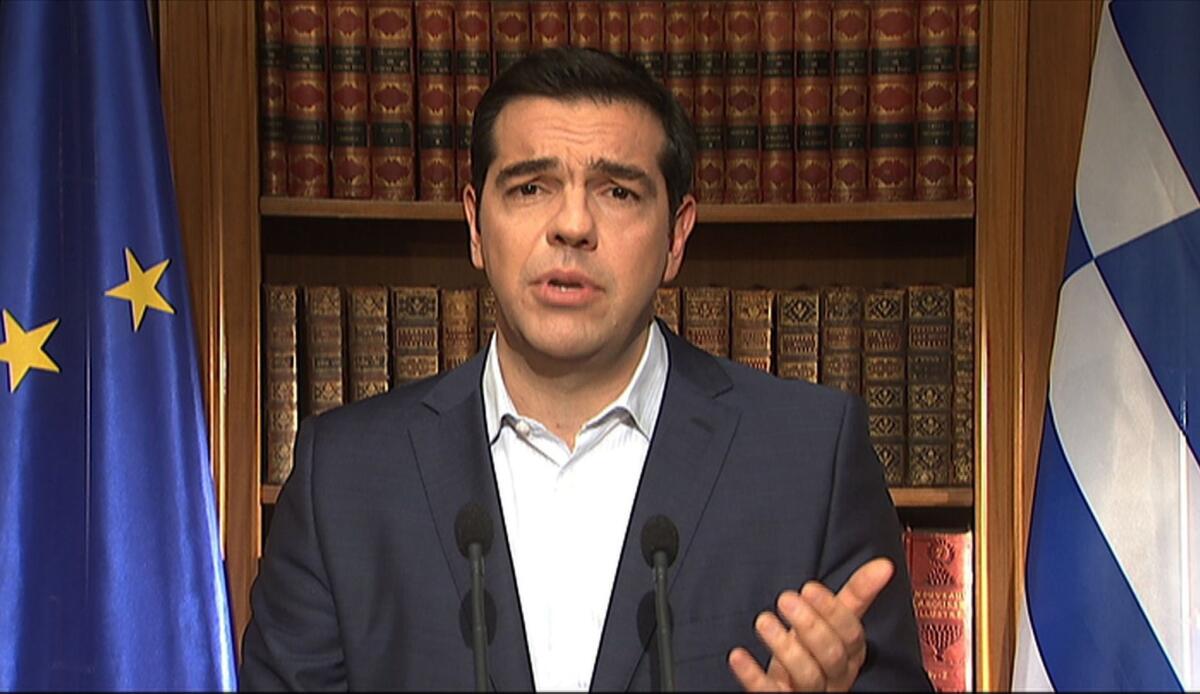Tsipras says Greece ready to accept creditors’ terms with new bailout

Greek Prime Minister Alexis Tsipras addressing the nation on television July 1, when he appeared to backtrack on refusal to accept creditors’ terms for more bailout funds while continuing to urge Greeks to vote “no” on the proposals in a referendum set for the following Sunday.
Reporting from Athens — Greek Prime Minister Alexis Tsipras backtracked Wednesday on his refusal to accept Eurozone creditors’ demands for deeper spending cuts in exchange for more loans to keep the economy afloat, telling the international lenders in a letter that the austerity measures were acceptable if part of a two-year extension of their bailout program.
But Tsipras continued to advise Greeks to reject the terms laid out by the creditors when they vote in a referendum Sunday on whether they are willing to endure more painful austerity.
The positive signal from Athens spurred a recovery on markets across Europe and Asia after two days of selloff by investors concerned about spillover for the global economy from Greece’s escalating financial and social crises.
With banks and the stock market closed for a third day, anger and panic were rising in Greece, prompting the head of the Orthodox Church to warn of the risk of political divisions swelling into violent confrontation.
“We must not let the poison of division touch our hearts. … It would be a crime committed against future generations,” Archbishop Ieronymos said in his appeal for calm as protests for and against the bailout terms spread through Athens.
Division also surfaced among European Union leaders, with German Chancellor Angela Merkel standing by her refusal to negotiate with the Greek leadership until the results of the Sunday referendum are clear.
“I have set out my position and I have nothing to add to it,” Merkel said in Berlin.
The institutions that have loaned Greece $270 billion over the last five years have cast the referendum, called by Tsipras when he abandoned the negotiations Saturday, as the ultimate indication of whether Greeks want to stay in the Eurozone.
French President Francois Hollande departed from Merkel’s line, saying too much was at stake to delay work on crafting a new bailout program for Greece as the already cash-strapped country confronts empty government coffers and limited access to what personal savings citizens have left. Online banking transactions are suspended, and depositors can take no more than 60 euros a day -- about $66 -- from ATMs.
Eurozone finance ministers who consulted by teleconference late Wednesday agreed to wait until after Sunday’s vote to restart negotiations with Athens.
Tsipras, in a televised address, reiterated his call for Greeks to vote “no” on the creditors’ final offer, which technically expired Tuesday when Athens missed the deadline for a $1.8-billion payment to the International Monetary Fund. The second of Athens’ two bailout programs -- with the IMF, the European Central Bank and the European Commission that includes other Eurozone states -- also expired at midnight Tuesday.
Tsipras insisted, though, that even if Greeks follow his advice and reject the creditors’ demands for more cuts to public spending, primarily on pensions and government workers’ salaries, that the government intends to continue seeking a new debt-resolution agreement so that Greece can remain part of the Eurozone.
“Whatever the circumstances, the Greek government remains at the negotiating table and will remain there until the end,” he said. “And it will be there on Monday, immediately after the referendum with better terms for the Greek side.”
The letter Tsipras sent to creditors late Tuesday was obtained and posted online by the British daily Financial Times, disclosing the Greek leadership’s new position that it is “prepared to accept” the creditors’ terms for emergency relief as part of a new program for debt repayment for the next two years.
The lenders’ final proposal, disclosed late last week, calls for raising the money Athens needs to keep up with its debt payments with spending cuts rather than new taxes on business.
There were also signs of indecision over what the referendum outcome will mean among others in the Greek government. A huge banner urging voters to say “No to Blackmail and Austerity” was unfurled on the facade of the Greek Finance Ministry early Wednesday, only to be taken down a few hours later. Finance Minister Yanis Varoufakis appeared to distance himself from the message, saying via Twitter that it was put up by trade unionists without the ministry’s permission.
Times staff writers Chu reported from Athens and Williams from Los Angeles
Follow @cjwilliamslat for the latest international news 24/7. Follow @HenryHChu for news out of Europe.
More to Read
Sign up for Essential California
The most important California stories and recommendations in your inbox every morning.
You may occasionally receive promotional content from the Los Angeles Times.










